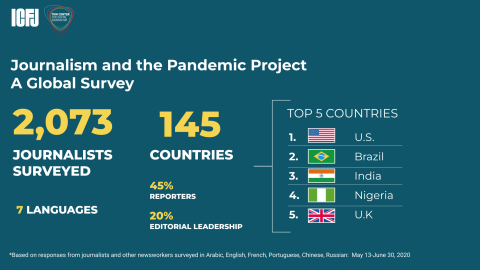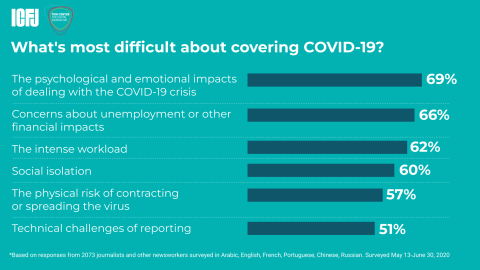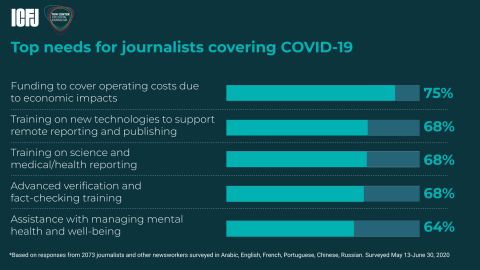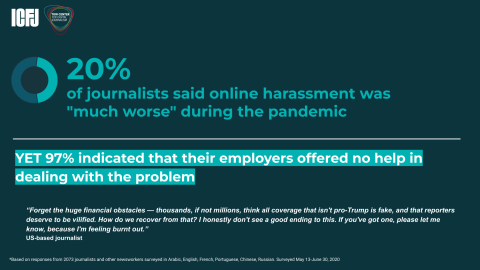
COVID-19 might not have resulted in the global news media extinction event predicted, but unrelenting waves of coronavirus over the past two years have taken a very significant toll on journalism globally.
For many journalists the prolonged and uncertain nature of the pandemic has presented a series of unique personal and professional challenges. Newsrooms were stretched to capacity, journalists became mentally and physically exhausted, some lost their lives to the virus, and many states used COVID-19 to restrict media freedom.
But despite journalists facing unprecedented pressure during the course of the pandemic, many experienced the crisis as a revitalization of their practice, deeper connections with both their vocation and their audiences, and new opportunities for publishers of independent journalism. In some cases, it has further served to develop creative and innovative approaches to digital storytelling, newsroom communications, audience engagement and counter-disinformation work, even in the context of external threats.
What are the longer-term effects of the pandemic on journalists and journalism? How can news organizations, donors and civil society adapt? And can this existential crisis now be recast as journalism's reformation moment?
These are the key questions ICFJ and Columbia University’s Tow Center for Digital Journalism are examining in the second phase of the Journalism and the Pandemic Project launched today.
Building on a global survey of over 2,000 journalists in 145 countries conducted in mid 2020 as the pandemic set in, the Project is now conducting a new survey to map the longer term impacts and needs of journalists around the world in the context of an ongoing pandemic, while also seeking to assess the myriad creative ways in which journalists have responded to the challenges and opportunities presented by a period of historic upheaval and transformation.
By taking this new survey (offered in five languages) journalists are contributing to a unique longitudinal study of global journalism's reaction to an historic event. The study will enhance understanding of how donors, policymakers and civil society organizations can support journalism under pressure.
The background
The first 30 findings published from the Journalism and the Pandemic Project at the end of 2020 highlighted COVID-19’s devastating impacts on journalism through an analysis of responses from more than 1,400 English-speaking survey participants in 125 countries. Our research during COVID’s first wave identified several main areas for concern: the interlinked issues of threats to the safety of journalists (including a significant COVID-era mental health crisis), media freedom erosion, the pernicious role of disinformation in the information ecosystem, and the viability and sustainability challenges confronting the news media.
Our key findings from the first phase of the project included the following:
- Politicians and elected officials were identified by 46% of respondents as a top source of disinformation.
- 81% said they encounter disinformation at least weekly, with more than one-quarter identifying false information many times a day.
- Facebook was identified as the most prolific spreader of disinformation.
- Nearly half said their sources had expressed fear of retaliation for speaking to journalists during the pandemic.
- 30% said that their news organizations had not supplied field reporters with a single piece of protective equipment during the first wave of the pandemic.
- 70% identified the mental health impacts of covering COVID-19 as the most difficult challenge.
When we analyzed the full vetted set of 2,073 international survey responses (including those submitted in Arabic, French, Spanish, Portuguese, Chinese and Russian) in 2021, we found that the trends identified were very consistent with the findings of the English-language survey.

At the global level, the 2,073 journalists surveyed ranked the difficulties associated with covering COVID-19 in exactly the same order as the English-language participants.

The same is true of the top identified needs of the journalists participating in the first survey - there was remarkable uniformity across language groups.

And one thing was very clear across the board: the viability of independent journalism in a post-pandemic world will not just be a question of economics. Ensuring the safety of journalists and defending media freedom are also critical to securing media viability, because unless journalists can report freely and without fear for their safety, financial security will not save critical independent journalism.

14 Recommendations for Action from the Journalism and the Pandemic Project
Today, we are also publishing the first 14 recommendations for action from the Journalism and the Pandemic Project, along with a guidance tool to aid implementation. Based on an analysis of our data from the first phase of the Project, including insights from roundtable discussions with state and civil society donors conducted in 2021, we have developed the following preliminary recommendations. They are designed to aid governments, donors and civil society organizations seeking to respond effectively to the impacts of COVID-19 on independent journalism globally.
- Prioritize democracy-reinforcing and counter-disinformation projects and programs (with a focus on critical independent journalism).
- Make grants conditional on meeting journalism safety requirements.
- Urgently address the mental health crisis affecting journalists and news organizations.
- Address the online violence crisis, which is being exacerbated in the context of COVID-19.
- Prioritize investment in collaborative/networked journalism initiatives.
- Focus on medium- to long-term investment to address the pandemic’s ongoing effects on journalism.
- Tailor support according to the size of the independent news organization.
- Invest in programs that support innovation in crisis management within news organizations.
- Bake research into projects/programs to help transfer and embed knowledge globally.
- Explore hybrid journalism-civil society journalism projects which can help effect social change and achieve sustainable development where the need exists.
- Convene funders while ensuring the ‘social distancing’ of the platforms and their corporate objectives.
- Invest in projects that help maximize trust and help defend independent journalism from campaigns designed to discredit and tarnish reliable, factual reporting.
- Invest in projects and outlets which emphasize diversity - in terms of staffing, thematic reporting and audience development.
- Convene journalists physically as we ‘reopen’ societies, as it is safe to do so.
In the final phase of the Journalism and the Pandemic Project, detailed case studies will be developed analyzing the characteristics of resilient news organizations that have withstood the COVID-19 crisis, or even thrived in the course of it, along with those outlets born in the midst of the pandemic.